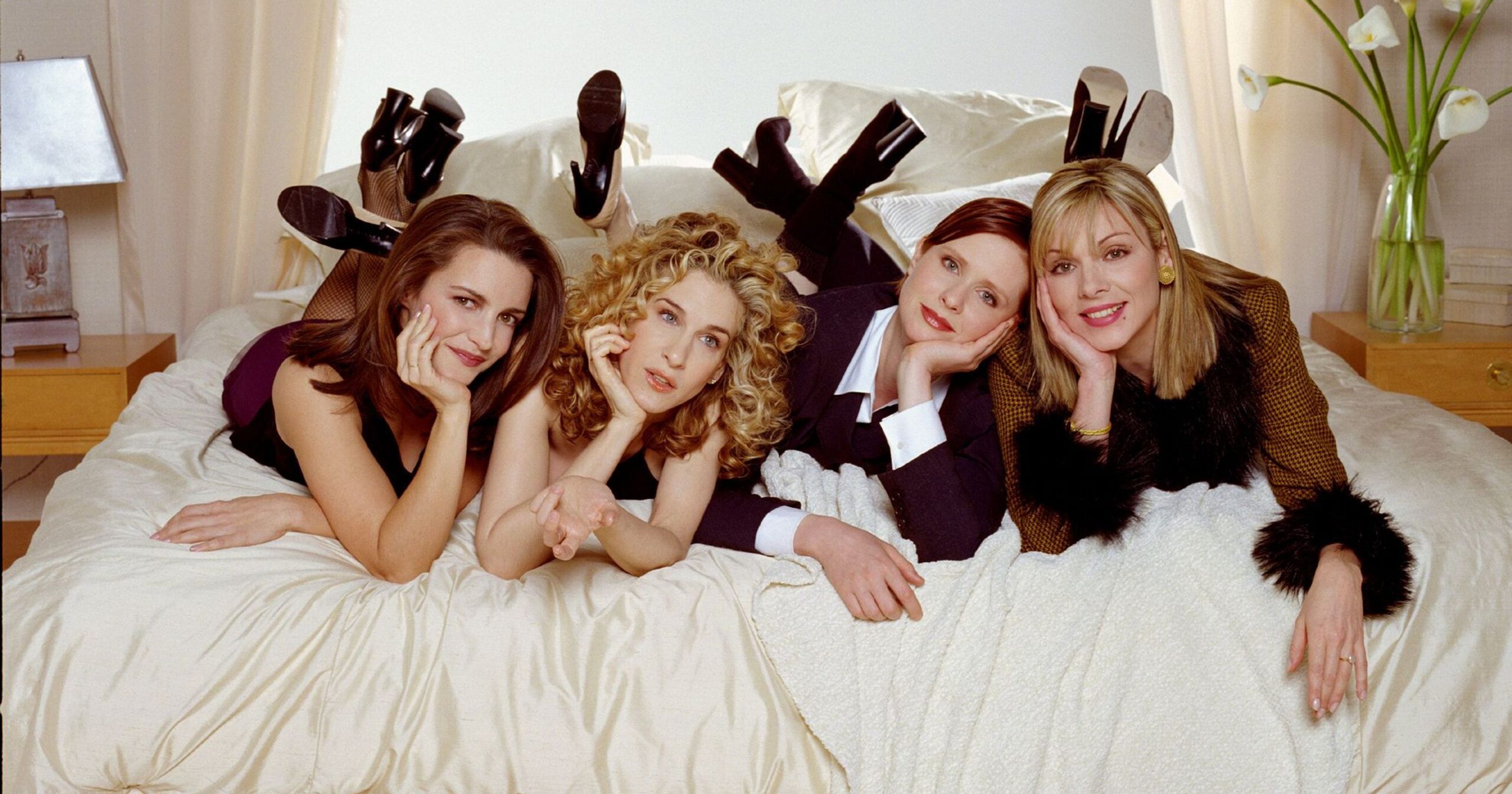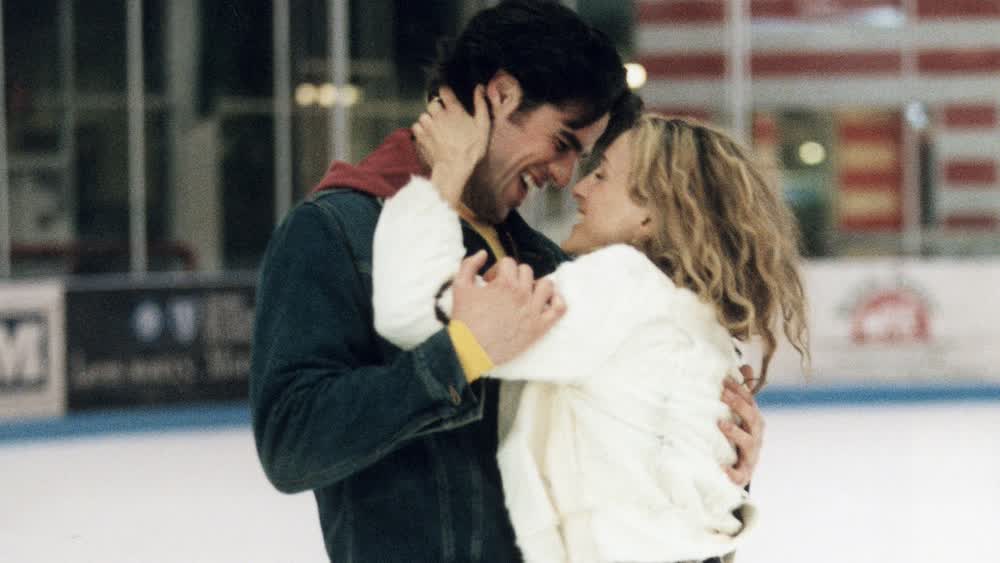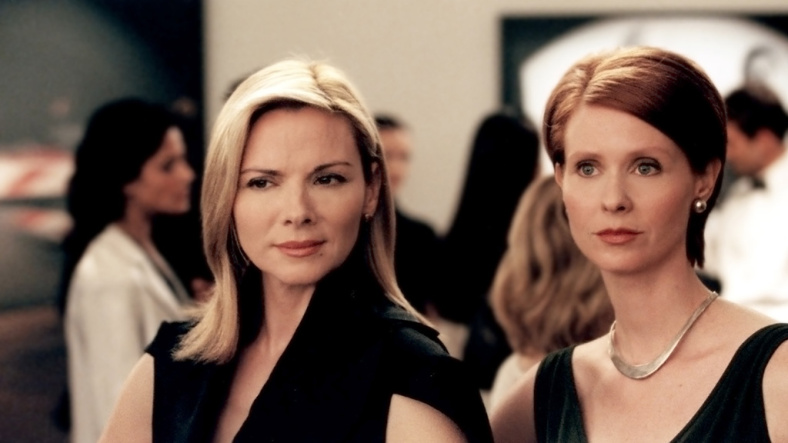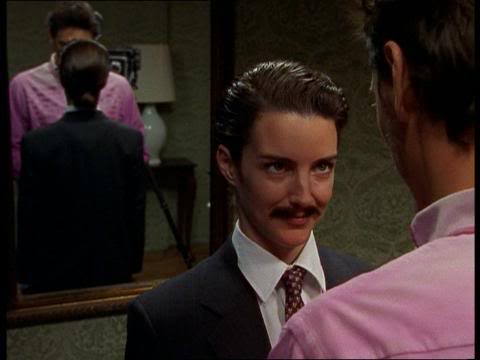Welcome back, loyal readers — and a warm welcome to any new Unicorns in the house! It feels like the last few decades had some seminal moments for bi+ representation — for better and for worse. Most returning readers know I love to talk up positive representations in this column. But I also think it’s crucial to shed light on the more problematic narratives that were fed to us — even if they were formative.
One of those impressionable stories we covered here was Basic Instinct — one of the biggest blockbusters of the 1990s, but also a lightning rod for “evil bi” stereotypes. Most of that movie was seen through the male gaze, hoisting up Catherine’s sexuality as more of a titillating detail than a true character aspect. This assessment sat in the general American conscience for a solid decade. That is, until an episode in the third season of the influential Sex and the City came along. What did this add to the dialogue? I decided to go back and revisit the episode “Boy, Girl, Boy, Girl” (2000) to find out.
Before I continue, I should give a few heads-ups here. First and foremost, this review will include SPOILERS for the whole episode (hey, I’m thorough). This review will also include a content warning: biphobic language. Oh, and if this is your first time in this borough, I highly suggest you read the original article to get an idea of our metric, then come back and rejoin us here.

Ready? Absofuckinlutely. So sit back, kick off your Manolo Blahniks, and let’s do this.
Sex and the City likely needs little introduction for many people, but I don’t want to be presumptive, so let’s make sure we’re all on the same page. The HBO comedy focuses on the sexcapades of Carrie (Sarah Jessica Parker), a Manhattan sex columnist, and the adventures and discussions of her three friends living, loving, and banging in the Big Apple. Daring for its time, SATC dove headfirst into a lot of sexual topics surrounding female desire, introducing multiple ideas, catchphrases, and even commodities into the modern American zeitgeist. (Suddenly even bars in the Midwest had cosmopolitan drinks at easy reach on their menu.)
In Season 3, Episode 4’s “Boy, Girl, Boy, Girl,” Carrie starts dating Sean, a younger, cute guy who’s a good ice skater and an even better kisser. And he casually mentions he is bi. Carrie tries to be nonchalant about it but instead barrels into a lively brunch conversation with her girlfriends, where she tries to make peace with this new information. She ultimately decides to give dating Sean a try, all the while asking variations of “but who do you really prefer”? Sean is patient and eventually takes her to a party including his queer circle of friends. During a game of Spin the Bottle, she gets kissed by God, AKA Alanis Morrissette. She decides the whole idea of bisexuality, including Sean, isn’t for her and leaves the party.
Look, I’m going to be honest— this is probably one of the toughest reviews I’ve ever had to write because it hits so close to home. SATC was huge when I was in high school and college, and most of the ideas and attitudes it put on display were ingested at lightning speed — most of the ideas became shorthand responses in conversations with people in my life. It gave me a sexual vocabulary for things I was just starting to figure out, but also served condemning judgments in quip form for subjects outside of the show’s (narrow) view of sexuality. So there is still a part of me that is so grateful it aired, but another part which resents some of what Carrie and her gang brought to the proverbial table.
My love for this show is a complicated one. That said, I am really going to try to be fair in my assessment of this episode, even if it had personal repercussions in my life.

What I Liked:
Now that I’ve said my disclaimer, I have to say, re-watching parts of this episode that weren’t seared on my psyche were surprising. Sean is completely comfortable with being bi — he freely uses the word (modern shows — take note!), he has no hang-ups about his sexuality, and he reassures Carrie many times he is interested in her. Honestly, he showed near-saintlike patience with Carrie’s probing questions and insecurities. Sean is generally very self-assured, charming, and hot to boot. In a world that still has problems conveying positive bi+ men portrayals in media, this character was a treat to look at again. Sean is a goofy but lovable Ken doll and would have done Carrie a world of good if she had kept him around for a while.
Also, while Samantha (Kim Cattrall) got a lot of flak for being a modern nymphomaniac, this sex-positive publicist was one of the few who was open to the idea of a different sexuality outside the straight/gay dynamic. Yes, she infamously says the “try-sexual” line (linked below), but she doesn’t bat away the idea of bisexuality outright. I tried to remember, as I watched this episode, that this story would have taken place in 2000, so while Samantha isn’t as welcoming as 2019 me would have liked, for a straight woman she was fairly evolved at the time.
A few other themes explored in “Boy, Girl, Boy, Girl” were also a treat to watch. The whole show deals with the blending of gender, gender roles, and the girls all push themselves in ways I would not have expected. The story also manages to show a fun and welcoming — if confusing-to-Carrie — queer party, devoid of jealousy or drama. There’s even the casual mention of old exes helping one another conceive via egg donation – this is back when Y2K jokes were still fresh. That is pretty damn progressive.
What I Didn’t Like:
Oh Mylanta. Where to begin.
I guess it’s best to take the bull by the horns and just drop off the notorious brunch discussion here so everyone can see why this was (and is still) so upsetting:
There is so much to dissect here. Honestly, the biphobic jokes came so fast and furious as I watched this scene I couldn’t write them down fast enough. (On a personal note, I heard every single one of these dismissing jokes flung at me in the years following the episode whenever I got the nerve up to say I was bi. That shit still stings.) The only one who seems even remotely open to the idea is Samantha, but even she looks at it all as “experimentation”.
This whole scene has a different level of pain to it when we know now the woman playing Miranda, former gubernatorial candidate Cynthia Nixon, is bi in real life. As a bi actress myself, I can’t help but wonder what her thought process was during the shoot day for this scene. I have to separate myself and not judge my characters all the time (otherwise how would I play villains, etc). But Nixon spent the next decade in interviews defending her sexuality after this influential episode aired. I wonder what she thinks about this scene nowadays. I’m not sure how much creative influence she would have had with the writers, but I hope in some alternate timeline she took the producers aside and helped get some nuance into the dialogue, and that show (and world) became a better space for bi acceptance. Because this scene was a national lesson in bi-erasure.

Unfortunately, the deplorable behavior doesn’t stay at the brunch table. Even though Sean (Eddie Cahill, whom Parker hand-picked for this role) assures Carrie his bisexuality isn’t all about sex, “it’s about the person”, she continues to silently judge any queer person that crosses her path. Even though the party she attends is warm and welcoming to her (even complimenting her fabric-world-blending pleather dress), she continues to see bisexuality as a “game”. And while yes, it’s absurd to see adults playing spin-the-bottle at a chic New York City party, that doesn’t really excuse her crappy behavior of leaving Sean and their relationship at the party when he was nothing but kind to her.
Carrie is a character who is a sex columnist, but there is little sex positivity on display here. We are supposed to believe Carrie will write about orgy etiquette without batting an eye, but the idea of being attracted to more than one gender is wholly unacceptable to her? This is less about personal boundaries and veers into the territory of bigotry. I think of the viral meme of Woke Charlotte from the Instagram account @everyoutfitonsatc:
The Rating:
Whoo, boy. I am torn on this one, and I only covered my major talking points about this episode.
In a way, re-watching “Boy, Girl, Boy, Girl” is a good way to see just how far we have come in bi+ representation — and how far we still have to go. Sex and the City was revolutionary in its own way, but not on the subject of bisexuality whatsoever. What could have served as a baseline for decent treatment for when Samantha started dating a woman the following season devolved into a laundry list of nasty attitudes and names for bi+ people. It’s not out of the question to assert this episode probably hindered bi+ visibility in mainstream media for years. Talk about a squandered opportunity. I would even argue repulsive, biphobic punchlines kept a generation in the closet for a few administrations.

I only give one unicorn because Sean seems completely lovely; ice-skating gives me panic attacks, but I would go into the “death rink” with him any time. I hope he found someone far better than Carrie, someone who would accept him for who he is without hesitation — or a shoe-hoarding complex.
